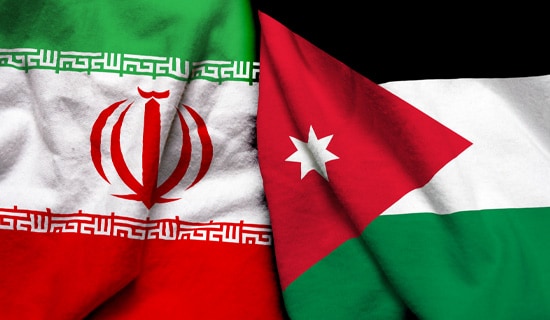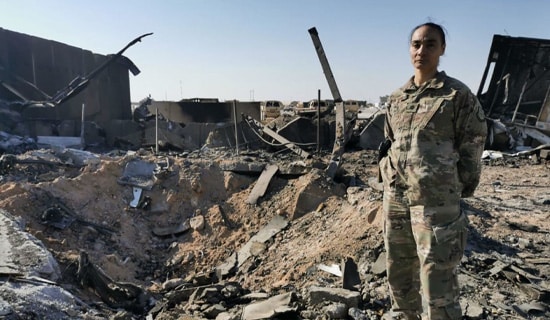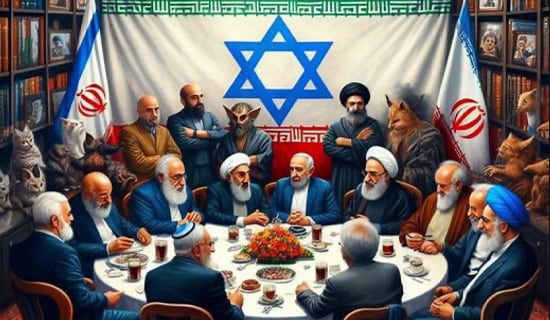The spokesman of the Greek Orthodox Church in Jerusalem, Father 'Atalla Hanna, who is a Palestinian Arab, stated his own and the Church's support for suicide attacks and for all forms of Palestinian resistance to the occupation. Subsequently, Greek Orthodox Patriarch of Jerusalem Patriarch Irineios I, who distanced himself from Hanna's statements, decided to replace him - a move not well received by the Christian Arabs.
Hanna's Statements
In a lecture given at the Arab League think tank The Zayed Center for Coordination and Follow-Up in Abu-Dhabi on June 19, 2002, Hanna said: "The fundamental principle endorsed by all the Palestinian political factions is to continue the Intifada against the Israeli atrocities. Therefore, the Church fully supports the resistance for the sake of liberation from Israel. As you know, the political factions in Palestine agree on the continuation of the Intifada, which includes different ways of struggle. Some freedom fighters adopt martyrdom or suicide bombings, while others opt for other measures… Don't expect us to keep [a] distance and watch. We are in the struggle whether it is martyrdom or any other means… The Muslims and the Christians are one and cannot be separated from the struggle for the liberation of Palestine. We are Palestinians and Arabs." [1]
Hanna also noted: "There is a large Christian presence in the various factions of the Palestinian resistance and in the various Palestinian political factions." [2]
Similar statements by Hanna appeared in the Jordanian daily Al-Rai and in the United Arab Emirates' daily Al-Watan, in which Hanna stated that young Christians were joining the Hamas movement to carry out operations with explosives against Israel, and that he supported such operations because they were the only weapons the Palestinians have to resist the occupation.
As soon as these statements were reported, Hanna denied them: "When I spoke of resistance, I was referring to nonviolent resistance, which is a legitimate right. I never mentioned martyrdom operations, but spoke of resistance. I sent letters of clarification to the UAE's Al-Watan and the Jordanian Al-Rai."[3]
The Reaction of the Greek Orthodox Church
Father Jibrail Naddaf, Patriarch Irineios I's aide, was the first to condemn Hanna's statements: "Even if I were not a priest in the Patriarchate, as a human being… I do not agree with [these] statements… We have seen no denial by Father 'Atalla Hanna of what the papers have reported him saying. We never call for killing and bloodshed. This is completely unacceptable. These operations damage peace in the Middle East. This is a dangerous and irresponsible statement. The Patriarch does not agree with it… It is our obligation to oppose these declarations. Even in the [Palestinian] Authority they oppose [these] operations… He [Hanna] does not represent the Patriarchate with these statements." [4]
The Greek Orthodox Patriarchate issued an official communiqué on July 4, 2002 authored by the Greek Orthodox Synod. It included the following: "1) Monsignor Theodosius ['Atalla Hanna] has never been the official spokesman of the Greek Orthodox Patriarchate in Jerusalem, in Israel, in Palestine, or in Jordan. 2) His statements do not represent the Church's position. 3) The Greek Orthodox Patriarchate, has been, and remains, distant from politics. It condemns forms of violence and terror, supports the peace process, and calls for love, brotherhood, and coexistence among all human beings. 4) From this moment onward, the Greek Orthodox Patriarchate's official statements will be issued solely by the official spokesman belonging to the office of the information committee." [5]
Several days later, Patriarch Irineios I replaced Hanna. In a statement, the Patriarch accused Hanna of supporting Palestinian terror because of the latter's refusal to sign a document condemning these operations. The Patriarch appointed Father Ophichius [a Greek] as spokesman and announced that any statement Hanna might make from now on would be his own and not the Church's, which empathizes with the victims of terror and violence. [6]
SUPPORT OUR WORK

The Reaction of Father Hanna and the Orthodox Arabs
Father Hanna rejected his dismissal and told the London daily Al-Zaman: "The decision to fire [me] is illegal, illegitimate, and baseless… I will not comply with the decision and I will carry out my daily duties as spokesman for the community without considering [this] decision." Hanna also said that his dismissal was part of an agreement with Israeli Prime Minister Sharon according to which Israel will recognize Patriarch Irineios I as the Greek Orthodox Patriarch in exchange for Church concessions on lands it owns in Jerusalem. [7]
The Arab Orthodox community was displeased with Hanna's dismissal. It issued a communiqué stating that Hanna was the Church spokesman whether Patriarch Irineios I liked it or not. The statement also called on Greece's Foreign Ministry to intervene in the matter, and on Arab states with diplomatic connections with Greece to explain [to the Greek authorities] why the Patriarch's move was dangerous. The communiqué also addressed Christian Arab and Orthodox Arab communities in Palestine and Jordan in a call to boycott the Greek Patriarch. It said that if the Patriarch did not rescind his decision within 24 hours, unexpected measures would be taken. [8]
'Uday Bajali, secretary of the Nazareth [Orthodox Arab] Community Council, said that Hanna's dismissal was aimed at distancing him from the administration of the Jerusalem Patriarchate, so as to make it easier to sell Church endowments in the future. He also said that Patriarch Irineios I had exploited the Jordanian government's agreement to give several Greek priests citizenship and allow them to join the Jerusalem Patriarchate so as to expand the Greek presence in the Church and distance Arabs from Church leadership and administration. Bajali said that Patriarch Irineios I's decision to replace Hanna showed his unfriendly attitude, as a Greek, towards the Arab community that had been struggling for the Arab identity of the Church since 1523 - when the Ottoman Sublime Porte [9] stepped in and fired the last Arab Patriarch, whose name was also 'Atalla.
Dr. Rauf Abu Jaber, head of the Greek Orthodox Organization in Jordan, said that the decision to dismiss Hanna because of his political positions was inappropriate, and that by so doing, Patriarch Irineios I had capitulated to the Israeli government. Abu Jaber warned of the danger inherent in Patriarch Irineios I's continued antipathy towards the Arab members of the Orthodox community and in his bias in favor of Israel. [10]
[1] http://www.gulf-news.com/articles/news.asp?ArticleID-55045, June 20, 2002.
[2] www.zccf.org.ae/LECTURES/A2_lectures/231.htm
[3] Al-Sennara (Israel), July 5, 2002.
[4] Al-Sennara (Israel), July 5, 2002.
[5] Al-Quds (Palestinian Authority), July 11, 2002.
[6] Al-Sfir (Lebanon), July 12, 2002.
[7] Al-Zaman (London), July 13, 2002.
[8] Al-Sfir (Lebanon), July 12, 2002.




